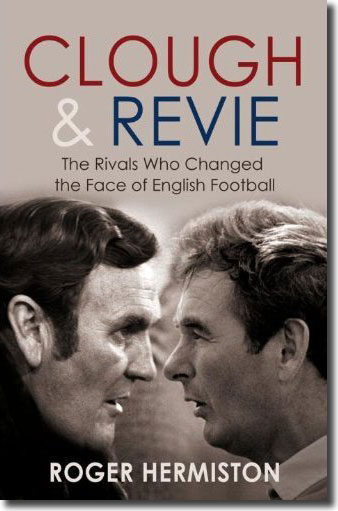 Part
1 Rebuilding from the back - Part 2 Defending
the Cup - Part 4 The Revie for Everton affair
- Results and table
Part
1 Rebuilding from the back - Part 2 Defending
the Cup - Part 4 The Revie for Everton affair
- Results and table
The early months of 1973 in English football were dominated
by irritable bickering between the managers of Leeds United and Derby
County.
The degree of ill feeling between Don
Revie and Brian Clough had been painfully clear for some time, but
in those few weeks the bitterness of the public slanging matches between
the two men plumbed new depths, piquing the interest of the football press.
Before the year was even a month old, the sparks were flying
in earnest, as related by Roger Hermiston in Clough & Revie: The Rivals
Who Changed the Face of English Football: 'On Sunday, 28 January 1973,
Clough travelled up to Leeds to be one of the special guests at an evening
event at the Queens Hotel. Hosted by Yorkshire Television with the Variety
Club of Great Britain, it was designed to celebrate the very best of international
sport and for the county to select a sports personality of the year.
'Five hundred guests took their seats in the elegant, art
deco building. With speakers of the quality of Harold Wilson (former prime
minister, then leader of the opposition), comedian Leslie Crowther and
Clough himself, all was set fair for an entertaining evening.
'Peter Lorimer had been forewarned that he'd won the coveted
top award. Leeds had an FA Cup replay
against Norwich City the following evening in Birmingham, but Revie
was happy for Lorimer to stay and receive the trophy as long as a car
was standing by to whisk him off to the Midlands straight afterwards.
'Harold Wilson presented Lorimer with his award, the pictures
were taken and the Leeds winger, thrilled to have followed in the footsteps
of Jackie Stewart, left the room and headed for Birmingham. He never heard
what followed.
'Clough stood up to speak and promptly told his audience:
"I have sat here now for approximately two and a half hours, and
I am not replying to anything or anybody until I have had a wee. And I'm
being very serious - you get on your bloody feet and go to the toilet,
you get a beer, and then if you've not got to get up early in the morning,
get back and listen."
'Eleven minutes elapsed before Clough returned. He then
launched into an astonishing tirade against the Leeds team. First of all,
he informed the absent award winner that he'd won "despite the fact
that he falls when he hasn't been kicked, and despite the fact that he
protests when he has nothing to protest about".
'Then he turned his fire on others, as John Helm, who covered
the event for BBC Radio Leeds, recalls: "He absolutely tore the Leeds
players to shreds. This is where he first came out with his famous statement
about Eddie Gray, that if he'd been a racehorse he would have been shot.
He said Bremner was a little cheat. He said the side should be deducted
ten points and relegated for all the cheating and cynical football they'd
put on. Of course, everyone in the audience was just absolutely gobsmacked,
because these players were idols to the Yorkshire public and here was
someone lambasting them in front of them, when they didn't think he was
a manager to lace Revie's boots anyway."
back to top
'Clough's outburst was greeted with shouts of "get
off" and "sit down", but he merely responded to the hecklers
by saying, "I was not particularly glad with the idea of speaking
to you lot. I have to stand up here, but you are sitting in the crowd,
which hides you." He then described one complaining member of the
audience as a "mumbler", adding, "We are becoming a nation
of mumblers. Stand on your feet if you have anything to say. Come up here
and make the speech if you think you could do better than me."
'Eventually, he realised he had gone too far and told the
crowd, "If I have made a mockery of Yorkshire sport, I apologise.
I was told before I came that no matter what I made of my speech, the
dignity of the occasion would prevail."
'There had been little dignity in Clough's performance.
He sat down to boos, then signed some autographs, while many guests decided
they'd had enough and left the room.
'When Yorkshire TV aired the programme, Clough was cut out
of it. Lawrie Higgins, YTV's head of sport, explained, "I wouldn't
give this man a minute of our time. He was insulting to many people. It
is always a gamble when you invite someone to speak - but responsible
people don't usually act in this way."
'Clough was unrepentant in the following days. He told the
Daily Mirror: "They didn't tell me beforehand it was being
filmed. They didn't brief me on what I could and could not say. And if
in future they want a puppet to get up and say something to please everybody
in the room, I suggest they invite Basil Brush, instead of asking a football
manager to give up his only day off of the week."
'Clough suggested that the Leeds supporters in the audience
had behaved as they did "because they still haven't forgiven Derby
for winning the championship". Observers at the dinner noted that
Clough had been annoyed because his name on the toast line was "Brian
Clough, manager of Derby County", when he felt it should have read
"Brian Clough, manager of Derby County, First Division champions".
'Later on, Clough would acknowledge that his behaviour that
night left something to be desired. The apology he offered, however, was
to Harold and Mary Wilson, not to anyone at Leeds United: "I wrote
to the Wilsons, sending flowers to Mary and telling them that my rudeness
in Leeds all those years ago had been 'on my conscience for too long'.
They wrote back, a kind letter as always, and I'm glad I got it off my
mind."'
It was an astonishing turn of events and shocked many people,
but initially, at least, no one from United rose to Clough's bait, though
Don Revie was growing increasingly frustrated at the continual sniping
at his club.
He used his Saturday column in the Yorkshire Evening
Post on 10 March to snap back, also 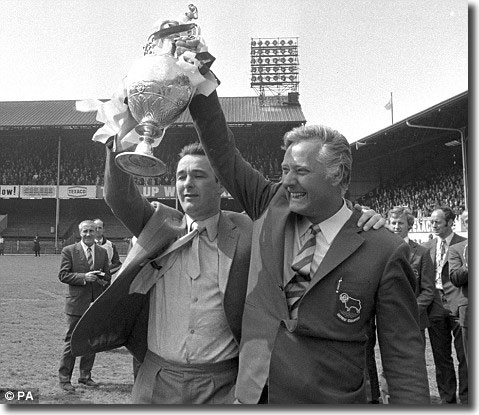 commenting
on his side's 3-2 victory at the Baseball Ground a week earlier.
commenting
on his side's 3-2 victory at the Baseball Ground a week earlier.
'It must be abundantly clear to most soccer followers that
Derby County manager Brian Clough and myself are not exactly the best
of friends. As our relationship stands at the moment, he is the last person
with whom I would wish to be stranded on a desert island, and no doubt
he feels the same way about me.
'Why? From my point of view it all boils down to the fact
that I dislike the way Clough repeatedly knocks other personalities in
the game - especially rival managers. I think it is wrong to criticise
your colleagues as Clough does because the job is difficult enough without
any of us slitting each other's throats.
'Sir Matt Busby, Sir Alf Ramsey, Malcolm Allison and Alan
Brown before he lost his job at Sunderland have all had verbal lashings
from him.
'Generally, there is a tremendous spirit of good fellowship
among the League's managers, but that wouldn't be the case if we were
all like Brian Clough.
'I find it surprising that he should appear to be so indignant
about teams going in hard for the ball. No matter what he might say to
the contrary, you can take it from me that Derby are as physically intimidating
as anyone when the need arises. This was shown last Saturday when Leeds
overcame Derby 3-2 at the Baseball Ground in a match littered by no less
than 55 fouls - 26 of them by Derby players. Therefore, Derby can be classed
as one of the most rugged and fiercely combative sides Leeds have met
this season.
back to top
'In all fairness, I must say that the poor condition of
the pitch made a lot of the fouls on either side look worse than they
really were. The pitch was so muddy that once a player had committed himself
in the tackle, it was virtually impossible for him to pull out.
'I don't go along with Clough's view that Leeds were lucky
to win.
'Although our first two goals came from penalties, and the
third from a rare bad back pass by Colin Todd, I thought we still created
the better chances throughout the match.'
Revie and Clough had crossed verbal swords prior to the
match. Following Eddie Gray's successful return to first team action,
the United boss pleaded with referees to give him some protection from
the game's hatchet men.
Clough retorted acidly: 'I have read in our local paper
that Don Revie has come out and appealed for the opposition to let Eddie
Gray play for the rest of the season now he is over his injury troubles.
Everybody knows my standpoint - I want 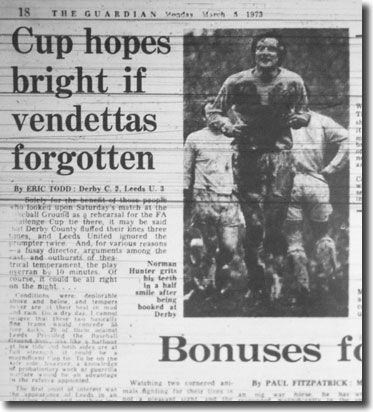 everybody
to be allowed to play football and that is why I just can't resist a reply.
All I want to say is this - I hope Eddie Gray gets as much chance to play
football as the players who come up against Norman Hunter.'
everybody
to be allowed to play football and that is why I just can't resist a reply.
All I want to say is this - I hope Eddie Gray gets as much chance to play
football as the players who come up against Norman Hunter.'
In the eventuality, Gray was not risked after bruising a
toe in training; Revie sprang a shock by giving 20-year-old Scottish centre-half
Gordon McQueen his first team debut. The Scot wore Gray's No 11 shirt
but partnered Hunter at the back.
The game was played on a mudbath at the Baseball Ground,
the notoriously poor pitch in appalling condition after heavy rain. The
weather did little to cool the tempers as the teams engaged in trench
warfare. There was a stream of badly timed challenges, McQueen sending
John McGovern clattering into the pitchside hoardings with one forthright
challenge.
With 25 minutes on the clock, Derby opened the scoring when
midfielder Alan Durban floated a free kick past United's defensive wall,
but Leeds were soon back on level terms. Young Rams striker Roger Davies
unwisely chose to try and find his keeper with a back pass on the unpredictable
surface and the ball only found the unmarked Lorimer. Goalkeeper Colin
Boulton was alert enough to reach the ball but in doing so he brought
the Leeds man crashing to the ground. Referee Ron Challis had an easy
decision to make, awarding the penalty, and Lorimer calmly sent the keeper
the wrong way from the spot.
In the 54th minute, Bates came on for the limping Reaney
and three minutes later Derby reclaimed the lead. Kevin Hector nodded
home Durban's curling free kick to score his 90th League goal for the
Rams despite Bremner's attempt to handle the ball as it crossed the line.
Hunter had a busy time over the following ten minutes: first
he received his eighth booking of the season for tripping Archie Gemmill;
then he cleared a dangerous situation in his own area. Within minutes
he was down the other end, earning a second United spot kick when he was
barged to the turf by Todd. The pace of Lorimer's strike was checked by
the clogging surface but the effort beat Boulton to bring the sides level.
Clarke settled the game after 71 minutes when he fastened
onto another poor back pass, this time from Todd, and slipped the ball
past Boulton.
It was just desserts for United and they gleefully celebrated
their 3-2 victory.
For the whole of the second half, young McQueen played under
the burden of injured ribs, and the defender did extraordinarily well
to last out the game. With the sub already on, he had little alternative
but to play through the pain. Don Revie was full of praise for the way
he had performed in his first senior United outing.
Mike Casey in the Evening Post: 'Critics will argue
that the tally of 50-odd fouls - incidentally these were almost equally
shared - was excessive. Yet only two or three fouls were vicious. Most
were the result of over enthusiasm.
'When things were going wrong, particularly in that hectic
first half hour as Derby threatened to overrun them, United's defence
worked heroically to weather the storm. While the champions were having
all their own way, United's two pocket sized schemers, Billy Bremner and
Johnny Giles, seemed to be concentrating on physical survival in the quagmire
which threatened to engulf them.
back to top
'Not surprisingly, with Derby dominating the midfield and
determined to strike the first blow, United's defence took a battering.
But they had the men for the occasion. Norman Hunter and Paul Madeley,
those tireless destroyers, chased, harried and finally flung back the
Derby menace. How these two giants worked in appalling conditions! With
first class support from full-backs Paul Reaney and Trevor Cherry, United
came through.'
Buoyed by their sixth win in eight games, United went in
to the first leg of their Cup Winners' Cup quarter-final, at Elland
Road against the Rumanians, Rapid Bucharest, in great heart.
Don Revie claimed that Rapid had 'the most remarkable goalkeeper
in the world - Necula Raducanu, whom Jack Charlton once described as "a
kind of Len Shackleton between the sticks". Charlton played for England
against Rumania at Wembley in 1969 and still talks about the way the flamboyant
Raducanu played to the crowd. It is not unusual for him to bounce the
ball off the inside of a post, or juggle it on his foot, thigh, head and
chest. I am all for players trying to express themselves … but that's
ridiculous!'
There were widespread predictions that the Rumanians would
attempt to kick Leeds out of the contest and they were every bit as physical
as feared. However, United never looked back once Giles had given them
the lead after fifteen minutes and duly secured a 5-0 victory, which Revie
described as 'one of our best performances in Europe'.
United kept up their title challenge with a 2-1 victory
over Everton, prompting Goodison boss Harry Catterick to describe them
as the 'best side by a mile' in the First Division.
A couple of days later, a United party travelled to London
to appeal the bookings received at Arsenal in December. Allan Clarke and
Trevor Cherry were unsuccessful and given two-match suspensions. Peter
Lorimer also failed, but had not yet totted up enough penalty points to
face a ban. Billy Bremner won his appeal, while a fifth player, Mick Jones,
was unable to appear because of a stomach upset.
Don Revie attended the hearings and was clearly becoming
concerned at the club's growing disciplinary problems: Norman Hunter had
yet to hear the outcome of his own appeal against the booking he received
at Derby, and was on the verge of his third suspension of the season;
Terry Yorath, Jack Charlton and Joe Jordan were all within four points
of their own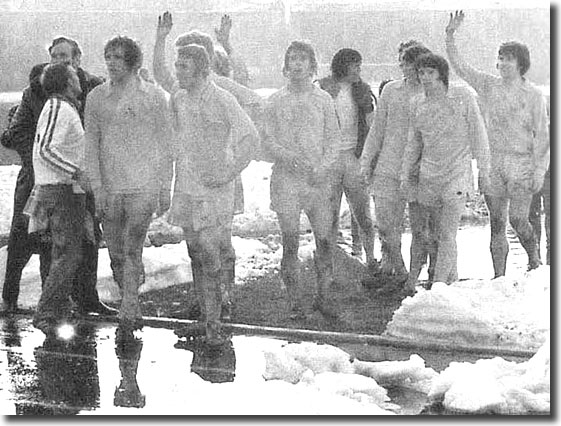 bans.
bans.
It boded ill for the forthcoming FA
Cup sixth round clash with Derby, which was expected to be another
fiery encounter. Feelings were intensified when Revie urged Brian Clough
to end his serial undermining of Hunter: 'I feel that all this criticism
of Norman - and not only by Clough - affects the judgement of referees.
When they read or hear other managers accusing the player of unfair tactics
- and worse - they are bound to be influenced to some extent when they
see him go hard into a tackle. We know he's a tough player, but he isn't
dirty. Clough has called Norman some disgraceful things recently. Before
he condemns him he ought to count the number of bookings one of his own
top defenders has had this season. Roy McFarland has been cautioned five
times and served a two-match suspension. Clough ought to put his own house
in order before he starts criticising others.'
Despite speculation that the game would be a bloodbath,
there was none of the expected thuggery; United were in fine form and
secured a routine victory by virtue of a first half strike from Lorimer.
The outcome was the best response possible to Clough and
put to bed for the time being the question of which was the better side;
it was United's third successive victory against the Rams, a run which
had started in October when they won 5-0 at Elland Road.
back to top
Nevertheless, Clough refused to let matters lie, as recalled
by Roger Hermiston: 'With the summer break nearly over, it might have
been expected that Clough would concentrate his thoughts and efforts on
a fresh attempt to win back the championship title. Instead, he chose
to go back into print with his fiercest attack yet on Revie's Leeds. The
back page lead story in the Sunday Express on 5 August was headlined,
"I Would Put Leeds in Division Two - Brian Clough lashes Soccer's
bosses for letting off Don Revie's 'bad boys'."
'What had angered the Derby manager was a Football Association
disciplinary commission hearing the previous week. Leeds had been let
off relatively lightly over their record of conduct on the pitch for the
1972/73 campaign. The punishment of a £3,000 fine had been handed down
- but it was effectively suspended, as it wouldn't be collected from the
Elland Road side if they showed a "substantial improvement"
in the coming season. Clough was apoplectic with rage: "Leeds United
should be starting the new season in the Second Division. The Football
Association should have instantly relegated Don Revie's team after branding
them one of the dirtiest clubs in Britain. As it is, the befuddled minds
of the men who run the game have missed the most marvellous chance of
cleaning up soccer in one swoop. No wonder Don Revie was smiling broadly
as he left the disciplinary commission hearing in London. I looked at
his happy face staring at me out of my newspaper in Spain. It just about
spoiled my holiday to read that the £3,000 fine has been suspended until
the end of the coming season."
'Clough went on to liken the punishment to "breathalysing
a drunken driver, getting a positive reading, giving him the keys back
and telling him to watch it on his way home".
'Revie's response came quickly, and in language unusually
blunt - at least in public - from him: "We all know that he can walk
on water. If he is not criticising Sir Alf Ramsey it has to be somebody
else. This time he has chosen Leeds United. I think it is time he shut
his mouth."'
Relations would continue to be fraught, but Revie had the
satisfaction of knowing his men had proven themselves conclusively the
superior side.
The Cup victory at the Baseball Ground was United's fifth
straight success and on 21 March they stretched the run to six with a
comfortable 3-1 triumph in the second leg of their Cup Winners' Cup clash
with Rapid Bucharest.
Bremner (calf injury), Cherry and Clarke (both suspensions)
were all unavailable for the game and the 16-man squad included Roy Ellam
and young Frank Gray.
Revie indicated that Leeds did not intend to rest on their
laurels: 'We have a five-goal lead from the first leg, but this does not
mean we shall be going all defensive. We are treating it as a normal game
which means we shall be playing as if the scoreline was 0-0.'
The Rumanians had few expectations of overturning the result:
when United arrived in Bucharest they were told the match had been switched
to a smaller stadium, officially because it was clear of snow which fell
heavily over the weekend. More cynical commentators suggested it was actually
because local interest had waned after Leeds' five-goal flourish in the
first leg.
The game started spectacularly with a goal and a penalty
miss inside two minutes.
After Paul Reaney broke up a Rapid attack, play moved swiftly
downfield for Mick Bates to open the scoring when he forced the ball home
off an Eddie Gray cross.
Almost immediately, Rapid had a golden chance of equalising
when Madeley was judged to have handled in the United area. Neagu sent
Harvey the wrong way from the spot, but his shot flew wide of the other
post.
Yorath came on as substitute for an injured Bates and set
up a chance for Jones after 20 minutes. The striker's header was chalked
off for offside. Three minutes later, though, he did make it 2-0, heading
home Madeley's cross.
back to top
Rapid pulled one goal back in the 58th minute when substitute
Constantin Dumitriu, who had replaced brother Emil at the break, forced
the ball into the net; but the game was long over as a contest by the
time Joe Jordan scored United's third with fifteen minutes remaining.
It was a noteworthy score, resulting from a header from 40 yards. Keeper
Raducanu came out to collect the ball but was distracted by the onrushing
Jones and the ball evaded both men and trickled over the line.
United's winning run came to an end when they were held
to a goalless draw on 24 March by Wolves at Elland Road and they dropped
another point when they failed to win at West Bromwich four days later
despite taking the lead through a brilliant Allan Clarke solo effort.
Albion's equaliser was a little controversial, with David Shaw flagged
offside only for the referee to rule that the effort should stand … echoes
of 1971 and the despised Ray Tinkler.
| |
Top of Division One - 28 March 1973 |
| |
Pos
|
|
P
|
W
|
D
|
L
|
F
|
A
|
Pts
|
| |
1st
|
Liverpool |
35
|
22
|
8
|
5
|
64
|
36
|
52
|
| |
2nd
|
Arsenal |
36
|
22
|
8
|
6
|
51
|
32
|
52
|
| |
3rd
|
Leeds
United |
33
|
18
|
10
|
5
|
57
|
34
|
46
|
| |
4th
|
Ipswich
Town |
34
|
16
|
10
|
8
|
48
|
34
|
42
|
| |
5th
|
Newcastle
United |
35
|
15
|
10
|
10
|
54
|
42
|
40
|
| |
|
|
|
|
|
|
|
|
|
Worse was to follow when United visited Maine Road on 31
March for Manchester City's first game since the departure of manager
Malcolm Allison for a £13,000-a-year contract at Crystal Palace. 'Our
best performance for many weeks, if not for the whole season,' declared
one delighted Maine Road season ticket holder after the game.
Tom German in The Times: 'The black crepe, or the
gay streamers, which unfurled at Malcolm Allison's sudden departure from
Maine Road for Crystal Palace - depending on whether one saw him as an
enlightened tactician or a voluble embarrassment - were quickly put aside.
"Forget all about him; he's gone now," urged a voice over the
loudspeaker system before Saturday's game with Leeds United. Outwardly,
at least, Manchester City seemed to respond to the exhortation; as if
to demonstrate their ability to dance a lively jig without the puppeteer
pulling the strings. It proved too much for Leeds and City won 1-0.
'When they put their mind to it, City are a highly mobile,
determined side. They were just that on Saturday; without finding their
rapier thrust they were eager to work and run to win the ball… The single
goal, which decided the match seven minutes from the end, was inadequate
return.
'Still, Leeds contained them coolly and methodically, working
their way out of difficulties with a neat and disciplined understanding
which underlined their considerable experience of hothouse conditions.
None did better than Yorath and McQueen, who steadied and matured as the
match developed; already the tall No 5 shows signs of donning Jack Charlton's
mantle, even to the extent of taking up position beneath the opposition's
crossbar when Leeds take a corner kick.
'The Yorkshiremen seldom found opportunity to show they
had teeth, however. Yet they made the best opening of the match as Bremner
sent Madeley away down the right to put a pass right to Jones' feet only
a stride or two from goal; Jones' tread was clumsy, though, but the chance
persisted as the ball ran free to Clarke who could do no better than strike
the outside of a post. 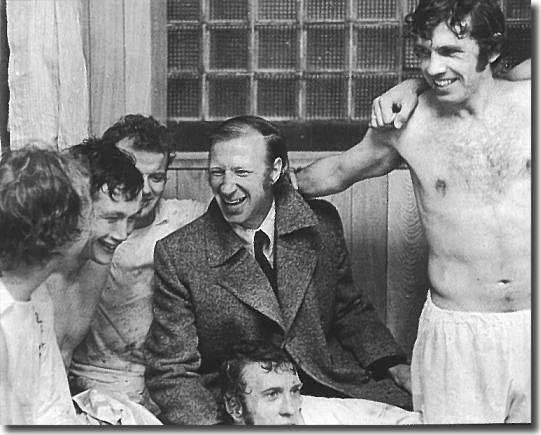 The
championship itself might well hinge on those errors of aim.
The
championship itself might well hinge on those errors of aim.
'Just when Leeds seemed about to collect the point they
coveted, Manchester scored; Towers shot into a confusion of players from
30 yards, Marsh skipped over the flight of the ball and it clipped the
inside of a post and went in. City had proved they could pull their own
strings.'
Surprisingly, the defeat was not mortal with Arsenal losing
at home to Derby and Liverpool dropping a point at Anfield against Tottenham,
but it was essential that United started maximising the haul from their
games in hand if their title hopes were not to disintegrate.
Their first opportunity came on Monday, 2 April, when Jack
Charlton was given a shock recall for the trip to Coventry. It was
the first time that the veteran, a month shy of his 38th birthday, had
featured in the first team since 22 November. A hamstring injury ruled
out McQueen, with Hunter, Bates and Gray also on the injured list.
Charlton gave an assured display, but it was Paul Reaney
who was the surprise match winner, netting his first goal since the opening
home match of the 1968/69 season.
Charlton's impressive return gave Don Revie a selection
headache for the FA Cup semi-final with Wolves. The World Cup winner was
clearly delighted as he commented after the game, 'I would love to play
in the semi-final, but at the same time I would not be disappointed if
I was left out. I can understand the position facing the boss. He cannot
turn the clock back and neither can I. We have an understanding and I
appreciate the difficult job he has to do.
back to top
'It felt great to be back, but I don't think I have been
as nervous since I was 16 and playing my first games for the club. After
playing in the reserves it is a tremendous feeling to run out with the
first team in front of a big crowd again. It was wonderful to be back
and nice to feel wanted again.
'I have tried to keep myself fit because there was always
the chance I might be needed towards the end of the season, but I must
confess I really thought I had played my last first team game. My selection
came completely out of the blue. It was most unexpected.'
Revie kept faith with the old war horse for the
semi-final. Tragically, Charlton pulled a hamstring on the half hour
and he had to be replaced by Joe Jordan.
A second half strike by Billy Bremner was sufficient to
settle an exciting game and secure United a fourth FA Cup final appearance
in nine seasons. A goal from Bremner had proven crucial on three of those
occasions.
The big games were coming thick and fast now for United
as their chase for honours continued on three fronts: four days 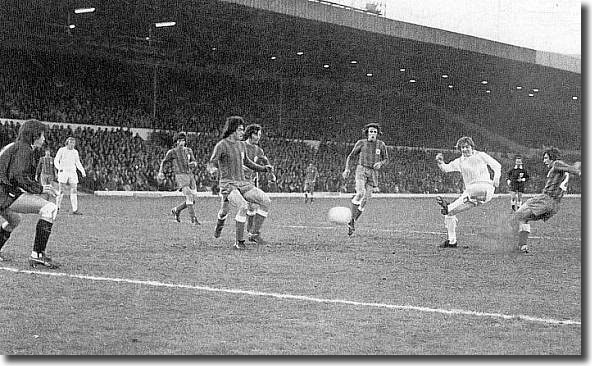 following
the Wolves game came the first leg of the Cup Winners' Cup semi-final
against Yugoslavia's Hajduk Split at Elland Road.
following
the Wolves game came the first leg of the Cup Winners' Cup semi-final
against Yugoslavia's Hajduk Split at Elland Road.
With McQueen, Madeley and Charlton all unavailable, Don
Revie was relieved to have Norman Hunter available again and deployed
him alongside Terry Yorath at the heart of his defence.
There was little to choose between the two sides in a closely
fought contest. Hajduk playmaker Jerkovic had an outstanding evening,
dominating midfield despite the presence of the Giles-Bremner axis.
Norman Fox in The Times: 'Leeds United abandoned
themselves to the worst traits of rude European football at Elland Road
last night and in spite of a goal by Allan Clarke, who was later sent
off, probably lost their chance of reaching this year's final of the Cup
Winners' Cup.
'Faced with the massed defences of Hajduk in this semi-final
round home tie, Leeds were unable to draw on their considerable experience
to find effective paths to goal and it was their personal annoyance that,
more than anything, provoked a theme of violence that Hajduk so aggressively
took up.
'Hajduk came with a reputation of not worrying overmuch
about conceding a few goals in first leg matches away from home. They
had lost 4-2 to Hibernian in the third round and won the tie with a 3-0
home victory, and in the previous round Wrexham won 3-1 in Wales and then
lost 2-0 in Yugoslavia for an away goals defeat. Predictably then, Hajduk
held themselves in defensive check, awaiting the occasional opportunity
to move the ball out to those two, or, in daring moments, three forwards
left at the outposts.
'Leeds spurned their own easily won domination, making some
uncharacteristically basic errors. Admittedly, they got their relatively
early goal, but how much more respect they might have won had they relied
more on their great skill and vast knowledge. When will this magnificent
team learn to turn the other cheek in European football, however difficult
that may be? Unnecessarily, they became involved in meaningless petulance
that wasted their own time in a game that, for safety, needed to be won
by several clear goals.
'Tactically, by their quick interception in midfield, Leeds
controlled the pattern of the game and their goal after 20 minutes was
only surprising in that it took so long to obtain. 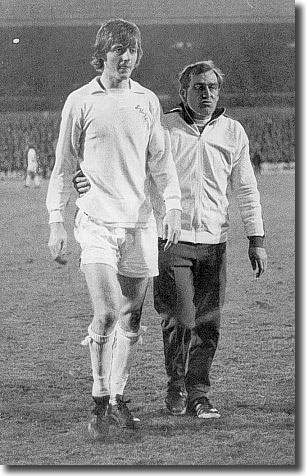 Lorimer
had been trying to align himself for a clear shot for most of that time,
but in the end the snatching ability of Clarke was needed. Jones fed Clarke
with the ball with a back header. Two men were in between Clarke and the
goal; he evaded them both as if he was stepping on and off a pavement.
His shot went low into the net.
Lorimer
had been trying to align himself for a clear shot for most of that time,
but in the end the snatching ability of Clarke was needed. Jones fed Clarke
with the ball with a back header. Two men were in between Clarke and the
goal; he evaded them both as if he was stepping on and off a pavement.
His shot went low into the net.
back to top
'Despite this goal and all of their possession, Leeds failed
to crown their play with forthright striking. Slowly as the first half
wore on, Hajduk widened their vision, not much, but just enough to suggest
that what could be interpreted as fear was sensible caution with a hint
of interesting flair from Jovanic and good shooting by Jerkovic, who could
also turn a pass as cleverly as Bates.
'When all the driving power of Bremner and Hunter came to
nothing against a five- or six- man defence, Leeds became frustrated.
That was understandable, but the crowd's furore when Clarke was sent off
was not really justified. Clarke had been one of the most provocative
players, always ready to leap into situations that were not always his
concern. When he retaliated after being badly fouled, the referee was
well within his rights to send him off. Clarke automatically misses the
return in Yugoslavia.
'The lesson for Leeds was probably that if their patience
can be exhausted before their skill, there is little point in competing
in these European competitions.'
On 14 April United met West Ham at Upton Park; there was
little to choose between the sides until Hammers keeper Bobby Ferguson
had to go off with concussion following a collision with full-back John
McDowell on the hour.
Powerfully built Bermudan striker Clyde Best took over between
the posts and performed commendably. Nevertheless, Clarke headed home
a Giles cross in the 83rd minute, and it seemed that United would gain
the two points; such delusions were rudely shattered when Pat Holland
popped up with an injury time equaliser.
The point surrendered left Leeds six shy of leaders Liverpool,
though they had two games in hand. The gap widened on Tuesday, 17 April
when Liverpool won 2-1 at Coventry. It was essential, therefore, that
United should secure both points against Manchester United at Elland Road
the following evening.
With Paul Madeley injured and Norman Hunter suspended, United
had to rely on the nascent centre-back pairing of Gordon McQueen and Terry
Yorath and were simply not at the races on the night. They lost out to
a 74th minute goal, scored by Trevor Anderson, an unknown £40,000 signing
from Portadown.
Barry Foster described Leeds in the Yorkshire Post
as 'a pale shadow of the side that had put the club in with a chance of
three trophies … The longer the game lasted, the more out of touch Leeds
seemed. Their attack spluttered into aggression occasionally, usually
with Clarke leading the way, but it could not keep up a sustained effort.'
Trailing Liverpool by eight points and having only ten left
to play for left United's chances of the championship hanging by the slenderest
of threads, though their remaining matches included fixtures against both
Arsenal and Liverpool.
| |
Top of Division One - 18 April 1973 |
| |
Pos
|
|
P
|
W
|
D
|
L
|
F
|
A
|
Pts
|
| |
1st
|
Liverpool |
39
|
24
|
9
|
6
|
69
|
40
|
57
|
| |
2nd
|
Arsenal |
38
|
22
|
9
|
7
|
52
|
34
|
53
|
| |
3rd
|
Leeds
United |
37
|
19
|
11
|
7
|
59
|
37
|
49
|
| |
4th
|
Ipswich
Town |
38
|
16
|
12
|
10
|
51
|
39
|
44
|
| |
5th
|
West
Ham United |
38
|
16
|
10
|
12
|
61
|
47
|
42
|
| |
|
|
|
|
|
|
|
|
|
Don Revie: 'We are disappointed, but this is how it goes.
It was an exciting match and we don't have any grumbles. Liverpool are
now in the enviable position at the top, but we'll have to press on and
hope for the best. One defeat doesn't mean the bottom has fallen out of
the season for us. Don't forget that we are in the FA Cup final, the European
Cup Winners' Cup semi-final and have an excellent chance of making the
final in that competition.'
Hopes were revived somewhat on 21 April when results went
United's way.
They faced relegation-haunted Crystal Palace at Elland Road.
Gordon McQueen and Paul Reaney were out injured and Norman Hunter was
suspended, so Revie brought back Paul Madeley at right-back and recalled
Roy Ellam for his first game since 18 November, when he had played in
the League match at Palace. He also gave 18-year-old Frank Gray his first
start in the No 11 shirt so often graced by brother Eddie.
United had already been pressing hard when they opened the
scoring after five minutes. From their fourth corner kick of the contest
Jones headed on Lorimer's flag kick and Bremner was well placed to score
with an overhead kick from 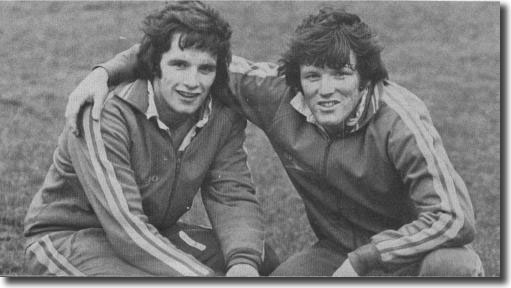 six
yards.
six
yards.
On 25 minutes, Gray scored an impressive debut goal, firing
home after goalkeeper John Jackson misjudged the flight of a Lorimer centre.
back to top
Twelve minutes later, United went further ahead. Giles,
near the edge of the Palace box, fed Lorimer who hammered home from 12
yards.
That seemed to slake the Leeds thirst for there were no
further goals until the 77th minute, when United added their fourth. Giles
began the move with a pass to Bremner, and the United skipper pushed forward
before chipping to Clarke. The England striker crashed home a shot off
the underside of the bar to register his 26th goal of a remarkable personal
season.
Barry Foster in the Yorkshire Post: 'The topsy-turvy
finale of this year's chase for the championship can still fall Leeds
United's way - and if they take it by attacking their way to it in the
fashion in which they beat Crystal Palace at Elland Road on Saturday it
will be a thrilling climax to the season.
'Their four goals more than doubled their goal haul in their
previous six League matches and gave them a better goal average than the
leaders Liverpool, the side they meet this afternoon in the match that
has the makings of the game of the season.
'It was the kind of free attacking play that Leeds were
playing in that purple patch last season when they hit seven goals past
Southampton and five past Manchester United. Overall the side did not
look as good as it did then but at this stage in the season and in the
middle of a run of six matches in 13 days it was a fine performance, well
worth remembering even though the defence was not always sure.
'Remembering for the way Bremner and Giles controlled things
from midfield, for the way the whole side played open, easy on the eye
football and for the confident start Frank Gray made in the big time.
'In his first full league game, the 18-year-old brother
of the Leeds international winger, Eddie, did all the right things and
sensibly Leeds did not ask too much of him - they just gave him his head
at the right times and he strode through the Palace defence in much the
way his brother might have done.'
Elsewhere, Liverpool were beaten 2-1 at Newcastle United,
while Arsenal had to be content with a goalless draw at Everton.
That combination of results set Leeds up nicely for their
crucial Easter Monday tussle with Liverpool at Anfield; victory would
take them within four points of the Reds with two games in hand on the
League leaders.
Reaney and Hunter returned to reinforce the defence and,
with Roy Ellam continuing at centre-back, Paul Madeley was used to bolster
a midfield that was missing Giles, absent with a calf injury.
It was a classic Liverpool-Leeds contest, fiercely contested
with few clear openings.
Barry Foster: 'The first half was a fascinating study in
the balance of power. Liverpool, as ever, went for goals from the start
but Leeds absorbed the pressure for ten minutes then hit back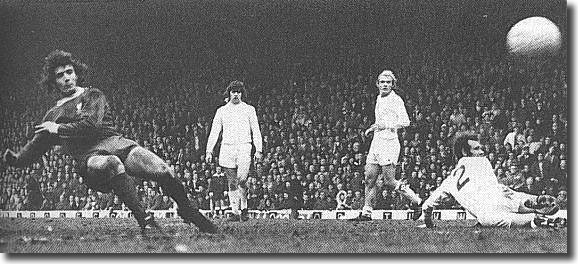 to dominate the middle of the half, only to concede ground again as the
break approached. It was undoubtedly the best part of the game.
to dominate the middle of the half, only to concede ground again as the
break approached. It was undoubtedly the best part of the game.
'It saw a duel within the duel with Keegan often getting
the best of Hunter; it saw Reaney producing a fine performance in defence
and Madeley dominant in midfield; it also saw the power of Hughes breaking
from Liverpool's back four and the persistence of Callaghan and Cormack
in midfield.'
Eric Todd in The Guardian: 'Liverpool nevertheless
must have despaired of breaking down the superb Leeds defence in the first
half. The cool, almost insolent, manner in which Leeds broke up the Liverpool
raids, and then switched to the offensive, had the Kop itself roaring
its approval. Sadly, however, the Leeds attack again was deficient in
shooting and finishing power. The absence because of injury of Jones and
Giles no doubt was partly responsible, and Clarke, without his customary
support, seldom had a look in against Lloyd, who marked him with scrupulous
fairness. And when Lloyd was occupied elsewhere, Clarke got little change
out of Lawler, who had a great game on his five hundredth appearance for
Liverpool.
back to top
'Lorimer once more was a big disappointment, and Yorath
is not yet equipped for the forward line. And when Lorimer missed a chance
of getting Leeds the lead in the first half, it seemed inevitable that
if Liverpool could hold out a little longer, they would win. And it was
so, although Madeley, Bremner and Reaney never were short of outright
brilliance.
'Liverpool's work in the second half carried the hallmark
of champions. Urged on by Smith, they applied such tremendous pressure
that Leeds just had to give ground. Keegan and Cormack were the chief
agents of destruction, but special mention needs to be made of Phil Thompson.
This teenage deputy for the injured Lindsay never faltered, never showed
signs of nerves on this most exacting of occasions, and his all-round
performance indicated that Shankly's only problem is where to accommodate
this outstanding young player when Lindsay is able to resume.
'At the end, the Leeds players, remembering their own reception
four years ago, lined up and applauded the Liverpool men off the field.
And they will be the first to congratulate Liverpool when, as it is almost
inevitable, they finish off the job on Saturday.
'Liverpool were the first to attack, and after Heighway
had fired the ball across the face of the Leeds goal, Smith tested Harvey
with a fine shot from 35 yards. An up and under by Thompson caused Leeds
further trouble, and it took them nearly 20 minutes to launch their own
first major assault.
'And while still on the warpath Leeds should have scored.
Clemence failed to hold the ball after a shot by Lorimer, Clarke turned
it back away from the goalkeeper, but Lorimer, who never used to miss
such opportunities, shot wide. Lorimer did better with a left foot shot,
but Clemence saved the ball and then Clemence saved from Jordan. After
that Clemence had very little to embarrass him.
'In the forty-seventh minute, Harvey tipped the ball over
the crossbar after another tremendous shot by Smith from 25 yards. After
Hall's corner, Thompson headed the ball back, Keegan headed it on, and
Cormack, with his left foot, drove it into the near corner of the net.
Four minutes from time Cormack centred, Harvey and Reaney for once left
the clearance to each other, and while they were still deliberating, Keegan
nipped in and scored.'
The 2-0 defeat formally ended United's slim championship
hopes and all but confirmed Liverpool's coronation. Afterwards Don Revie
congratulated old friend Bill Shankly, saying: 'I am delighted for Liverpool.
If there was one side after us that we would like to see win the title
it is them. I said at the beginning of the season that Liverpool would
be the team other sides would have to beat if they wanted to win something.'
United had little time to feel sorry for themselves, for
the next day they flew out to Yugoslavia for the second leg of their Cup
Winners' Cup 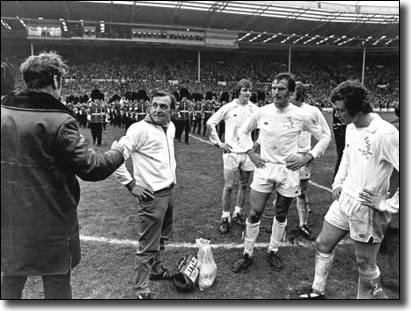 semi-final
with Hajduk Split.
semi-final
with Hajduk Split.
It was a classic European
away performance from United against impressive opponents and they got
the goalless draw they sought to secure their place in the final.
The gratifying performance renewed United's spirits after
the disappointment of Anfield.
They had two meaningless league fixtures to complete prior
to their FA Cup final appearance against Sunderland and took the opportunity
to give experience to some of their second string players. Gary Sprake,
Chris Galvin, Frank Gray, Peter Hampton, Garry Liddell, Jimmy Mann and
Billy McGinley all got rare opportunities for first team action. Jack
Charlton made his final league appearance at the Dell, though he had to
go off with a recurrence of his hamstring injury and gave way to Roy Ellam.
Both games were lost but mattered little in the grand scheme
of things as Don Revie's mind was focused on the Wembley date with Sunderland.
Trevor Cherry got a knock on the head at Southampton and there were fears
that he would be out of the final, but he recovered in time. His concussion
also meant that the defender was able to avoid a potential suspension
when his appeal against a caution received at Derby on March 17 had to
be postponed.
The FA Cup final clash
with the Wearsiders went down as one of the most disappointing days
in United's history - they were outplayed by spirited opponents who won
with a first half goal from Ian Porterfield.
It was a bitter disappointment for Don Revie, especially
given the intensity of ill feeling between him and Sunderland counterpart,
Bob Stokoe. It left him in emotional torment and the result must have
been a factor in a decision which Revie took shortly afterwards which
threw the entire club into turmoil.
Part 1 Rebuilding from the back - Part
2 Defending the Cup - Part 4 The Revie for
Everton affair - Results and table
back to top












 Part
1 Rebuilding from the back - Part 2 Defending
the Cup - Part 4 The Revie for Everton affair
- Results and table
Part
1 Rebuilding from the back - Part 2 Defending
the Cup - Part 4 The Revie for Everton affair
- Results and table
 commenting
on his side's 3-2 victory at the Baseball Ground a week earlier.
commenting
on his side's 3-2 victory at the Baseball Ground a week earlier. everybody
to be allowed to play football and that is why I just can't resist a reply.
All I want to say is this - I hope Eddie Gray gets as much chance to play
football as the players who come up against Norman Hunter.'
everybody
to be allowed to play football and that is why I just can't resist a reply.
All I want to say is this - I hope Eddie Gray gets as much chance to play
football as the players who come up against Norman Hunter.' bans.
bans. The
championship itself might well hinge on those errors of aim.
The
championship itself might well hinge on those errors of aim. following
the Wolves game came the first leg of the Cup Winners' Cup semi-final
against Yugoslavia's Hajduk Split at Elland Road.
following
the Wolves game came the first leg of the Cup Winners' Cup semi-final
against Yugoslavia's Hajduk Split at Elland Road. Lorimer
had been trying to align himself for a clear shot for most of that time,
but in the end the snatching ability of Clarke was needed. Jones fed Clarke
with the ball with a back header. Two men were in between Clarke and the
goal; he evaded them both as if he was stepping on and off a pavement.
His shot went low into the net.
Lorimer
had been trying to align himself for a clear shot for most of that time,
but in the end the snatching ability of Clarke was needed. Jones fed Clarke
with the ball with a back header. Two men were in between Clarke and the
goal; he evaded them both as if he was stepping on and off a pavement.
His shot went low into the net. six
yards.
six
yards. to dominate the middle of the half, only to concede ground again as the
break approached. It was undoubtedly the best part of the game.
to dominate the middle of the half, only to concede ground again as the
break approached. It was undoubtedly the best part of the game. semi-final
with Hajduk Split.
semi-final
with Hajduk Split.